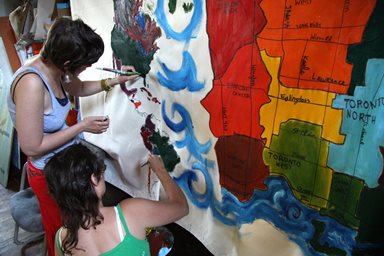Toronto Arts Council: Creative Communities
The Creative Communities Project Grants program provides funding to professional arts organizations and community groups for community arts projects that demonstrate vision and excellence
Community Arts Program Grants

The Creative Communities grant program provides funding to professional arts organizations and community groups for community arts projects that demonstrate vision and excellence. Projects may focus on community-engagement or the development of art practices, art forms and emerging artistic voices. The City of Toronto provides the funding for this program through its Community Partnership and Investment Program.
Art practiced at a community level creates a powerful sense of inclusion, understanding and the possibility of self-expression among participants. It can involve one or more art practices, such as music, dance, theatre, visual arts, and storytelling, but the collaborative involvement of professional artists with community members is a necessary component.
General Eligibility Requirements
- Applicants must be incorporated non-profit organizations or unincorporated collectives that operate on a not-for-profit basis.
- A collective is defined as a group of two or more artists working together under a group name, either on a single project or on an ongoing basis. This funding cannot be used to support an organization’s ongoing staff or faculty salaries. This program does not support schools, tuition-funded training programs, or curriculum-based programs.
- The project for which funding is requested must include the collaborative involvement of professional artists with community members.
- Applicants must be located within the City of Toronto and the activity for which the grant is requested must occur within the City of Toronto.
- Applicants may receive only one grant per calendar year through Toronto Arts Council.
Applicants may apply in one of two categories.
1. Arts Engagement:
Applicants may include community organizations, professional arts organizations and artists’ collectives. In this category, artists engage the community through their art form, work with community members to encourage maximum participation in the arts practice and the art making, and recognize that the process of collaboration is as important as resulting artistic products.
Examples:
arts programs in underserved neighbourhoods and communities that help overcome barriers to participation in the arts. Examples of possible barriers are age, physical ability, health status, geography, or economic and socio-cultural barriers.
artists’ collectives partnering with a community organization to undertake a project or residency. Applications relying on host-artist partnerships may include a Letter of Agreement between the host organization and the artist. (See www.torontoartscouncil.org/Grant-Programs/Community-Arts/Reference-Docum... and click Letter of Agreement Template).
Maximum grant in this category is $15,000. For requests to TAC over $8,000:
- the budget must show revenue from other sources.
- the TAC contribution may not exceed 50% of the project budget.
- in-kind contributions may not exceed 25% of the project budget.
2. Community Arts Development:
This category provides assistance to arts organizations and artists’ collectives for projects that develop the discipline of Community Arts through the development of art practices, art forms and/or emerging artistic voices. For the project to be eligible, members of the arts organization or collective must define their community of practice and terms of engagement with one or more art forms.
Examples:
An arts organization or collective may seek to work with an artist who practices an ethnically specific, culturally diverse, or traditional art form, to increase their artistic skills, knowledge, range of creative expression and build a community of practice, with the aim to engage a broader community upon completion of the project.
An artists’ collective that is part of a specific cultural community may seek to work with artists who have experience working with that community to create and present work in one or more artistic disciplines, with the aim to develop emerging or under-represented artistic voices of community members and/or address issues relevant to their community.
An arts organization or collective may hold a community arts event, such as a multidisciplinary arts festival or event that celebrates a specific community. However, simply identifying as a community-based event does not of itself make the project eligible. The event must include participatory arts activities in which members of the community are engaged by Toronto-based professional artists.
Maximum grant in this category is $10,000. Applicants must indicate a range of revenue sources, which may include donated goods and services.
Photo credit: Sonya Reynolds